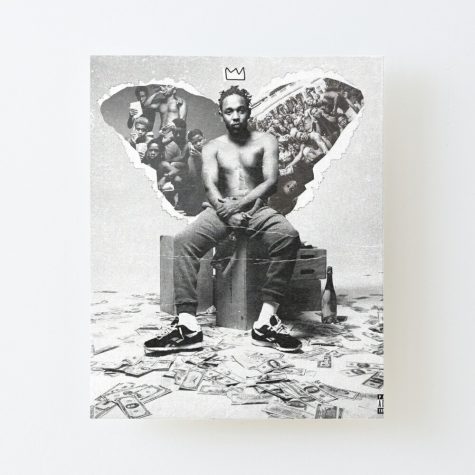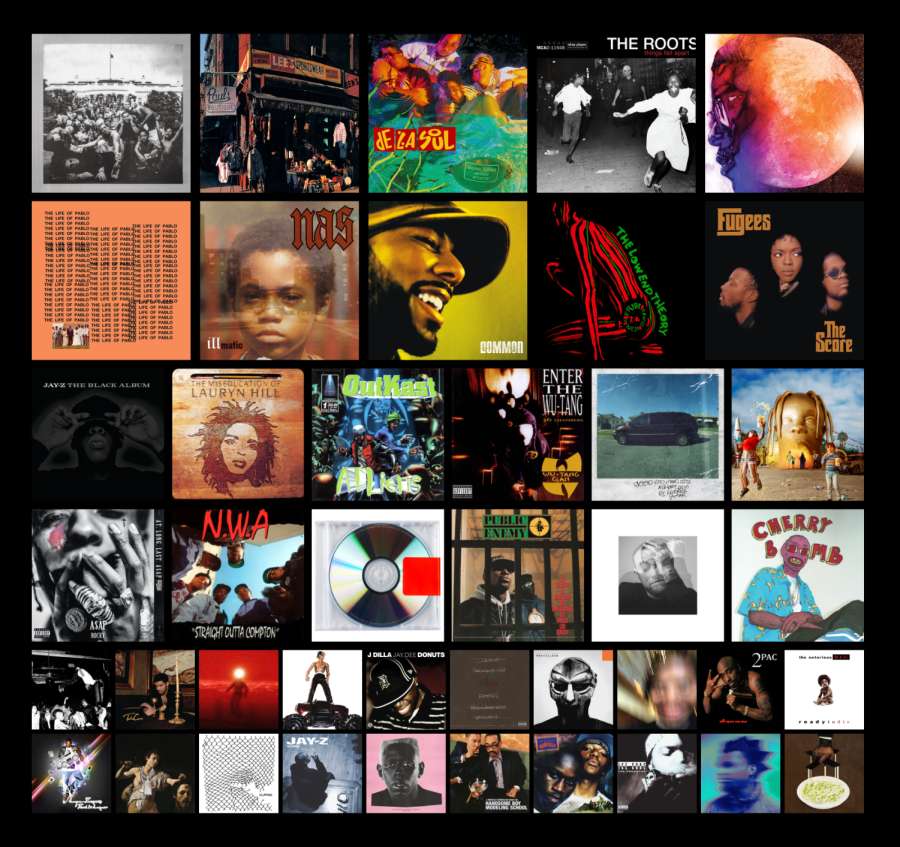The Best Hip-Hop Album of All Time?
March 31, 2023
The question that has been asked since the dawn of the hip-hop genre is: what is the best album? The image above displays a list I created of some of my favorite (and albums I believe to be some of the greatest) albums in the genre that is only accurate (in terms of listing) up until the 10th spot, but I do stand by that general list. But what would allow for an album like Kid Cudi’s ‘‘Man on the Moon’’ to rank so far high up above 2Pac’s ‘‘All Eyez On Me’’? Now, in the case of the list displayed, that is a mere oversight that has been allowed to pass through by bias, but in all seriousness, what would allow for an album to constitute the ‘‘greatest’’ in its genre? If you haven’t heard it already, the ‘‘Input/Output’’ podcast has tackled the subject with two very different albums being chosen for differing reasons, but that opinion has quickly changed (for me at least).
What constitutes an album for such acclaim?
Although all music is subjective (even though some opinions are wrong, objectively), there can be a set basis for which an album can be reviewed and regarded (and even though those circumstances themselves may be subjective to the listener, they are as close as any real relevant ratings may get). Within the podcast episode in which this was discussed, the following were utilized (although not too strictly) to judge the albums: level of influence (which may lower the chances of newer albums), the technicality within its production (which may lower the chances of older albums), the lyricism and/or storytelling within the album, and the ultimate message it sends across generations. Of course, other factors such as album cover, consistency (within a series of albums possibly), an album’s features, and even the origin of its creation can allow one album to lean over another in a tight race, but the former grounds are the priority when it comes to rating an album as the ‘‘greatest’.’
This is why when amid a discussion on the topic, many of the same albums are brought up frequently, as they all consist of these elements that make them so great (‘‘Illmatic’’, ‘‘Enter the Wu-Tang’’, ‘‘Ready to Die’’, ‘‘The Blueprint’’, etc.). Their impact on the culture of hip-hop does not need to be brought up, as most music fans recognize the great influence they were on the genre, which is why these albums from 20+ years ago are still hailed at the top of the genre.
What is my choice?
In the podcast episode, I stated that ‘‘Paul’s Boutique’’ was the greatest hip-hop album of all time. I have since changed my mind. While it is still in a top 3 position because of the pure influence, production, and flow that the album contains through the light-spirited raps of Mike D, Ad-Rock, and Adam Yauch, the longevity in terms of theme and lyrical emphasis simply lacks. Yes, it is made clear that it wasn’t the group’s point to make a socially relevant album through ‘‘Paul’s Boutique’’, but if an album were to be called the ‘‘greatest’’, an impact in such a lens should have been made for this long-lasting hold on the genre to take place. This is why I now believe that ‘‘To Pimp A Butterfly’’ by Kendrick Lamar is the greatest hip-hop album ever made (yes, better than ‘‘The Predator’’ Jaadler). Without going on an entire review of the album (which may be expanded upon in a podcast episode), it is simply the most socio-politically relevant album in the genre. Kendrick Lamar raps about a multitude of struggles that he faces within a broken and immoral society which he inadvertently finds himself within and supporting. On a larger scale, he brings up the issue of institutionalized racism within the economic, social, political, and even artistic systems of the United States, echoing themes that Q-Tip, Black Thought, and 2Pac were spreading in the 90s.

Does it qualify?
‘‘To Pimp a Butterfly’’ is the modern generation’s ‘‘Illmatic’’ in the sense of how it tackles the black struggle in a way that most modern albums don’t do justice. As he does emphasize the glory and fame of being a rapper through the wealth he has accumulated, he also speaks about the destruction such a collection of wealth to the elite few within a society may cause. Although the influence has not had its time to fully bloom (as it was released in 2015), in 10-20 years, most predict it will share the same historical acclaim within the genre that ‘‘Illmatic’’ has owned. The sheer technical ability of Kendrick’s rapping far surpasses that of Nas’ and for each verse to have such significance in the themes of the song and how it relates to the album as a whole is a great bonus in the listening experience. The production is centered around a jazz style that Kendrick incorporates into each song which many believe to echo the increasing significance of African American music within the United States during the Harlem Renaissance in the 1920s through the modern device of rap. This allows listeners across several genres to appreciate the styles within the album, especially on more musically experimental songs such as ‘‘i’’, ‘‘Institutionalized’’, and ‘‘For Sale’’ (the album’s music was also mostly produced by a live band in the studio, not simply a drum machine and synths). Few features are found across the album, but those few are masterfully placed and created, as Snoop Dogg, Thundercat, Bilal, George Clinton, and even Ronald Isley of the Isley Brothers grant lasting contributions to the album that greatly increase its quality and importance within the music community. Even the cover art itself is highly symbolic, as it features Kendrick Lamar and a group of people standing in front of the White House, shirtless, and holding money and/or alcohol. One can break down these symbolisms individually.
Across the album, the motif of Kendrick’s poem that begins with the line ‘‘I remember when you were conflicted’’ repeats, and each time it does repeat, it grows longer. This can display the listener’s understanding of Kendrick’s struggle, Kendrick’s understanding of his struggle, or the unraveling of the problems that have been so well hidden within America’s society that slowly finds the light through Kendrick’s poem. This is only fully realized in the final track in which Kendrick ‘‘interviews’’ a deceased 2Pac, using voice lines from interviews and asking him socially charged questions, resulting in a conclusion that is shaky in terms of the future of the African American community when speaking of the internal power struggle within the community and as a group within the oppressive society of the United States.
It was never meant to be a positive album or one of hope, it is simply the truth as Kendrick Lamar sees it. Even so, unlike ‘‘Illmatic’’, there is a high emphasis on individual self-realization in terms of one’s purpose within life and their community, whether that means supporting social movements, moving up the social ladder, or simply loving oneself, Kendrick makes that one of the lasting messages within the album amidst all of the uncertainty that he raps about. It is the variable that must grow to help prevent these dangers of oppression or conflict and lead to understanding within the community, but realizing the problems within the individual self must come first before tackling the problems within the societal institutions that are inherently unequal. If that message does not prove that this album deserves the title of ‘‘greatest’’, then I truly believe no other album does, not even ‘‘Illmatic’’.


